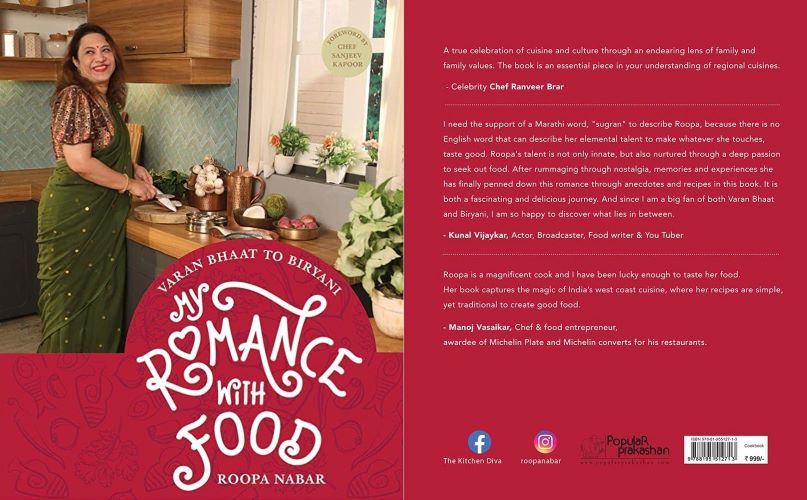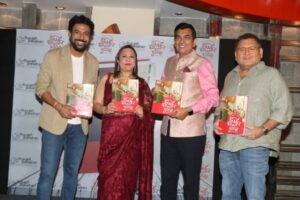Love and passion are two most important ingredients for cooking, says Chef Roopa Nabar

My Romance with Food by Roopa Nabar is published by Popular Prakashan
Rajkumari Sharma Tankha
While Roopa Nabar’s professional food journey started in 2011 with her participation in the show Food Food Maha Challenge (Food Food TV Channel), cooking is something that always held her special attention. The fact that many of the local old recipes are almost on the verge of extinction pains her no end. And, to preserve these recipes for posterity, Nabar has come came out with her first cook book, My Romance with Food. The book, released recently, contains several traditional recipes from the kitchen of her nani, dadi and aai, among others.

“My father hailed from a small village near Ratnagiri and my mother from Karwar. I got married to a medical doctor who hailed from Kolhapur, whose mother came from Belgaum. That’s how my kitchen became a melting pot for recipes from all these towns and villages,” she says, adding that a sequel will also follow “as there is so much more to be shared with the world”. Life & More spoke to the passionate chef–cum-author about her experience with the writing of this book, her favourite recipes, and more. Excerpts:
What’s the idea behind writing this cook book?
I am from GSB community which is spread predominantly in south west of Maharashtra, coastal areas, Goa, and part of Karnataka. The food is made with simple back yard vegetables and ingredients available locally. My family and friends appreciate the food I cook. But I it is underrated by the outside world. Hence, I always wanted to document these family recipes for the future generations so that they remain connected to their soil.
In a way, this book is an ode to the invisible connect of recipes and culinary traditions that bind families to communities, communities to villages and villages to culture. There are many family recipes that are not replicated and on the verge of extinction, which are now preserved in this book.
How did you go about it? Was it challenging?
When the pandemic struck in and the world came to stand still, the wheels of My Romance with Food started rolling. I had worksheets of recipes from my aajis, aai and mother-in-law. I compiled them, recreated them in my kitchen, and got them photographed for the book. While doing this I revisited all my favourite sights, smells and sounds in my kitchen. I leisurely completed the book in two years with the help of a food stylist and my creative team.
It was very challenging as many recipes have seasonal and hyperlocal ingredients.
How many recipes are the traditional dadi, nani kind of recipes in the book?
All the three sections in the book namely Native kitchen, Grandmother and mother’s kitchen and mother-in law’s kitchen contain the traditional dadi, naani recipes which are forgotten which I have tried to revive. These amount to almost 90 per cent of the recipes in my book. In my kitchen section, I have taken liberty and added a few of my signature recipes which are not classical GSB recipes.
Tell us about your favourite recipes/dishes?
It is very difficult to point out my favourite recipes however these are a few that come to my mind:
KISHMOOR, the dry shrimp salad, an accompaniment which is a palate changer.
PAACH POHE, or five types of Pohas. A different type of Diwali celebration in Konkan region.
CHUTNEY PAPLET, stuffed pomfrets with green mint chutney, again a special treat for special occasion at my home
KOLHAPURI MUTTON THALI, a Mecca for meat lovers.
Who are your favourite chefs and why?
Chef Sanjeev Kapoor, my mentor who inspired me to do wonders in my kitchen and gave me a platform to showcase my recipes on Sanjeev Kapoor khazana.
Chef Ranveer Brar down to earth and humble whose recipes are very easy to follow and has an amazing way of talking as he demonstrates.
Chef Gordon Ramsay, I love his fiery temper and he makes a very challenging and difficult recipe look very simple in his demonstrations.
Any anecdote concerning food that you would like to share with us?
The first time I tasted a Kolhapuri Mutton Thali was with my mother-in-law. I still remember my eyes started watering and the mascara ran as I ate the Mutton Sukka and Tambda Rassa on the thali. I couldn’t decide if it was as spicy as it was good or vice versa, so I just continued eating like every other guests in the room. Now I realise one has to develop the taste of Kolhapuri Lavangi chillis.
Any advice you would like to give to new entrants in the kitchen – tips or anything?
Cooking is not as difficult as people think. If one cooks with love and passion one can become a great cook. Kitchen is a place where one goes when in good mood and it is where one goes to make a bad mood good. Just create a dish with your own intuitions and it will be a perfect dish.
Personally, what kind of food do you love?
I love simple home cooked food, but at the same time food is my top agenda when I am travelling in India or abroad. I love pan Asian food as it relates to my coastal cuisine.

